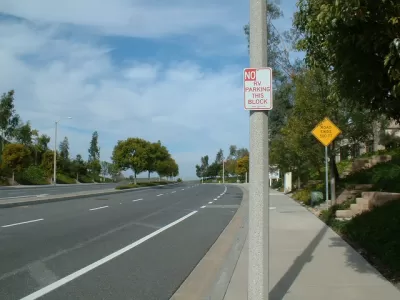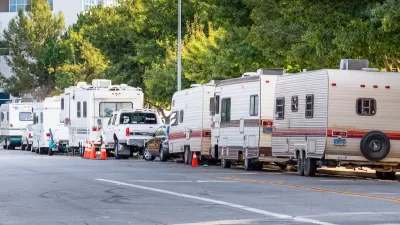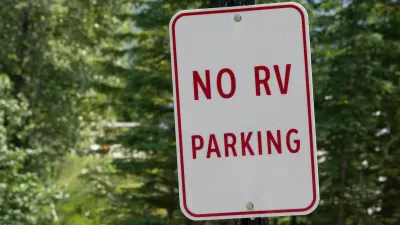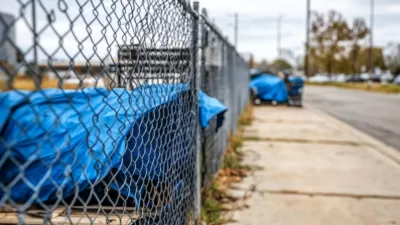Coastal cities are taking a no-tolerance approach to RVs on their streets, even as they otherwise strive to mitigate and prevent homelessness.

Although policies aimed at punishing or pushing out homelessness have long been decried by advocates, many cities are still—or even increasingly—pursuing them, according to journalist Kate Wheeling. In Pacific Standard, Wheeling highlights the problem as it manifests in Santa Barbara, California—where more than one-third of homeless residents live in RVs, and where "decades of cat-and-mouse games with city officials have made it nearly impossible for RV dwellers to find a place to park their homes."
Many cities justify RV bans with the untested assumption that parked RVs will lead to accidents by blocking drivers' line of sight. But some, including Santa Cruz and Los Angeles, have seen their bans overturned by lawsuits or by the state Coastal Commission for specifically targeting homeless people. Of Santa Barbara's ban, for example, Wheeling writes:
In the fall of 2016, a fed-up city council took more comprehensive action, voting unanimously to pass an ordinance banning on-street parking citywide for all oversized vehicles more than 25 feet long, 80 inches wide, or 82 inches tall. Unless, of course, that oversized vehicle is a government or utility vehicle, a contractor's pick-up, a commercial delivery truck, or a resident's or tourist's RV with the proper temporary permit. In other words, the new ordinance, which will go into effect in September, may not explicitly or exclusively describe RVs like Linda's, but no one is under any illusions about who the intended target is.
FULL STORY: DRIVEN OUT

Maui's Vacation Rental Debate Turns Ugly
Verbal attacks, misinformation campaigns and fistfights plague a high-stakes debate to convert thousands of vacation rentals into long-term housing.

Planetizen Federal Action Tracker
A weekly monitor of how Trump’s orders and actions are impacting planners and planning in America.

Chicago’s Ghost Rails
Just beneath the surface of the modern city lie the remnants of its expansive early 20th-century streetcar system.

Bend, Oregon Zoning Reforms Prioritize Small-Scale Housing
The city altered its zoning code to allow multi-family housing and eliminated parking mandates citywide.

Amtrak Cutting Jobs, Funding to High-Speed Rail
The agency plans to cut 10 percent of its workforce and has confirmed it will not fund new high-speed rail projects.

LA Denies Basic Services to Unhoused Residents
The city has repeatedly failed to respond to requests for trash pickup at encampment sites, and eliminated a program that provided mobile showers and toilets.
Urban Design for Planners 1: Software Tools
This six-course series explores essential urban design concepts using open source software and equips planners with the tools they need to participate fully in the urban design process.
Planning for Universal Design
Learn the tools for implementing Universal Design in planning regulations.
planning NEXT
Appalachian Highlands Housing Partners
Mpact (founded as Rail~Volution)
City of Camden Redevelopment Agency
City of Astoria
City of Portland
City of Laramie





























